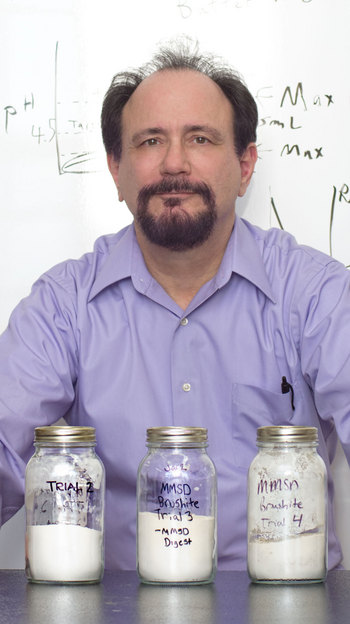Business will implement new phosphorus recycling process in Midwest
A University of Wisconsin–Madison startup is helping Midwest cities remove pollutants from wastewater through a new process that will benefit local farmers, too.
Phosphorus, a nutrient required for growing crops, finds its way from farm fields to our food and eventually to our wastewater treatment plants. At the plants, the nutrient causes major problems, building up in pipes or going on to pollute surface waters.

Phil Barak with samples of brushite, the phosphorus-containing crystals his technology collects from wastewater.
Photo: Rick Wayne
“For wastewater treatment operators, the earlier and the more completely they can get phosphorus out of the system, the better,” says Phil Barak, a UW–Madison professor of soil science.
Barak has developed a way to help both operators and farmers: a process that can retrieve phosphorus from wastewater in a form that’s valuable for agriculture. To commercialize the process, Barak has launched Nutrient Recovery & Upcycling, LLC (NRU) and begun discussing options with multiple communities.
Being able to remove phosphorus from wastewater and supply it back to growers is a win-win situation, says Barak. His process pulls phosphorus out of wastewater early in the treatment process in the form of a crystal called brushite, which can then be used by growers as fertilizer.
“We’re collecting phosphorus where it’s localized, at really high concentrations, which is the most economical place to collect it,” says Barak. “This works out in just about every dimension you can consider, from the treatment plants to the cost of recycling phosphorus as opposed to mining it new.”
Barak and his colleagues anticipate having a pilot system functioning in Illinois by July. Additionally, the NRU team will participate in the Milwaukee Metropolitan Sewerage District’s granting system to determine if a pilot project would be a good fit in Milwaukee. They hope to start collecting and analyzing data from Illinois by September, using that pilot system to lay the groundwork for others in Milwaukee and beyond.
NRU has received two federal Small Business Innovative Research grants and a SBIR Advance grant funded by the Wisconsin Economic Development Corporation. NRU is also a member of The Water Council, an organization of regional water companies and research clusters based in Milwaukee.
—Caroline Schneider




